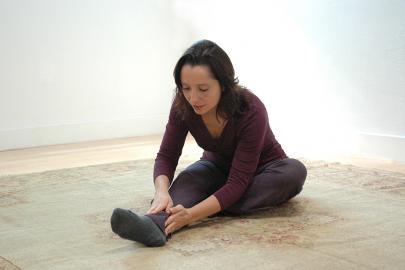
Recently I took a few days off, and was looking forward to having some time to myself, and time for introspection to balance the outer demands of everyday life in the city.
I was standing in the kitchen. It was apparent that most of the day would be spent in cooking and getting the house ready for guests. There was a lot of resistance that manifested as tension in the body—this was not what I had envisioned! I saw there was irritation towards the people around me and it was clear I was not contributing to the atmosphere in a positive way. I was standing in front of the stove stirring the pot cooking rice pudding. The movement of stirring reminded me to connect to the body. I saw that the moment before, I had been completely caught up in thoughts and emotional reactions to what was going on in my head and not at all participating in what I was doing. As I continued to stir the pot, the aliveness of being present with this simple activity was nurturing. Then I was present in myself, and from that taste of presence, I was able to relate to the people around me more constructively.
Instead of feeding the resistance and draining my energy, the activities and interactions were nurturing and energizing. As I became more receptive, the exchanges with others actually supported me to connect more deeply with myself, and there was a true experience of mutual giving and receiving.
Initially, I had the idea that I needed to retreat in order to connect with myself, but it was only an idea. The friction that arose between what I thought I wanted and what was actually happening supported me to remember my real wish, to be present. Throughout the day I was supported by the experience at the stove, remembering that I can be present, provided I connect to myself in each moment.
In his book The Four Relationships, Jon Schreiber, the director of the Breema Center, wrote about how we can cultivate mutual support (one of Breema’s Nine Principles of Harmony) in whatever we do:
We all get lost because we lose connection with our own center—the center of our being. The farther we are from our center, the more superficial and isolated we are, until we can’t understand one another.
Wherever you are is the starting point. Seeing where you are is much more important than where you wish to be, because you are not there. Seeing yourself as you are, seeing things as they are, is the most important thing in the world.When you are present, you are supporting everything that exists. Mutual support has many dimensions. If you go a little past the surface, you can see that who or what you support is not outside of you, not separate from you. If you go a little deeper, you find that the unity between the whole and the part exists in the principle of mutual support.
I was introduced to the Nine Principles via learning and practicing Self-Breema and Breema partner exercises. After applying them in classes, I discovered how I could bring body and mind together and apply the principles in everything I do: when I walk, when I eat, when I am on the phone. Practicing that in daily life became a great support to be more balanced and available. While stirring the pudding, I experienced first-hand that all relationships start with the relationship to myself, and only when I am present can I truly relate to other people.
*Mutual Support – Cultivating a Relationship With Others by Relating to Yourself was written by Birthe Kaarsholm and originally published in Natural Awakenings Magazine. Birthe is a Staff Instructor at the Breema Center in Oakland, California.
